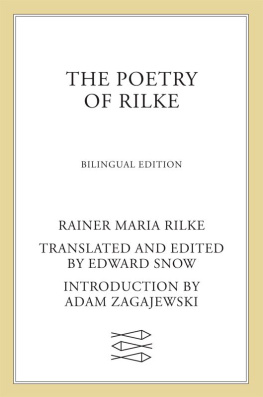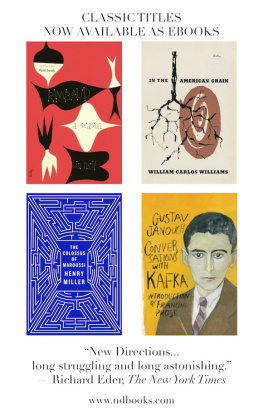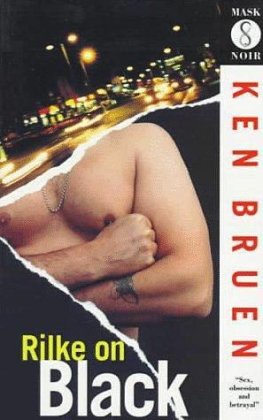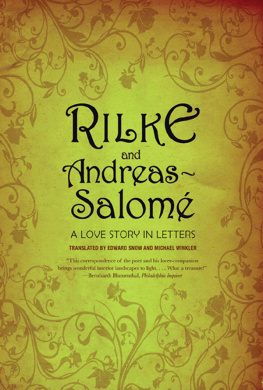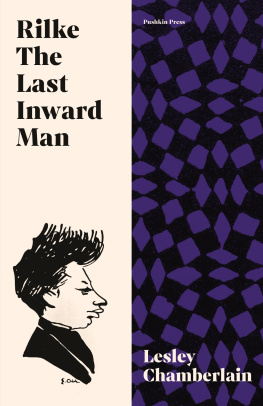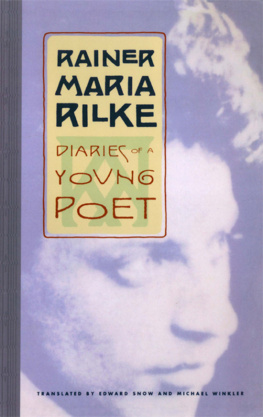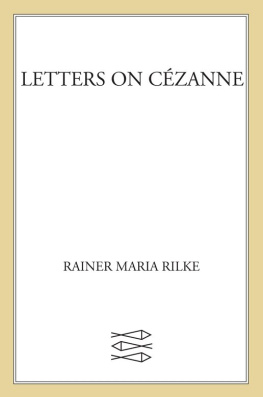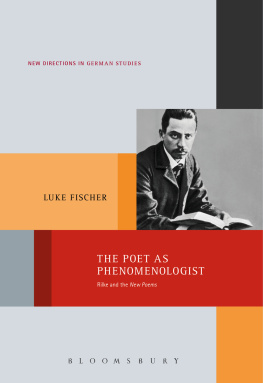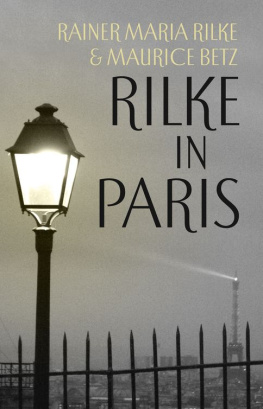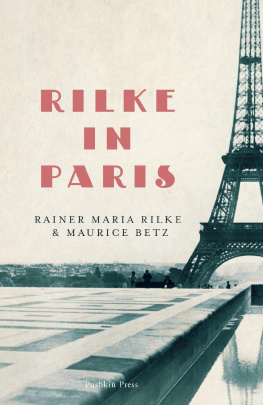Rilke - The Poetry of Rilke
Here you can read online Rilke - The Poetry of Rilke full text of the book (entire story) in english for free. Download pdf and epub, get meaning, cover and reviews about this ebook. year: 2014, publisher: Farrar, Straus and Giroux, genre: Detective and thriller. Description of the work, (preface) as well as reviews are available. Best literature library LitArk.com created for fans of good reading and offers a wide selection of genres:
Romance novel
Science fiction
Adventure
Detective
Science
History
Home and family
Prose
Art
Politics
Computer
Non-fiction
Religion
Business
Children
Humor
Choose a favorite category and find really read worthwhile books. Enjoy immersion in the world of imagination, feel the emotions of the characters or learn something new for yourself, make an fascinating discovery.
- Book:The Poetry of Rilke
- Author:
- Publisher:Farrar, Straus and Giroux
- Genre:
- Year:2014
- Rating:3 / 5
- Favourites:Add to favourites
- Your mark:
- 60
- 1
- 2
- 3
- 4
- 5
The Poetry of Rilke: summary, description and annotation
We offer to read an annotation, description, summary or preface (depends on what the author of the book "The Poetry of Rilke" wrote himself). If you haven't found the necessary information about the book — write in the comments, we will try to find it.
Rilke: author's other books
Who wrote The Poetry of Rilke? Find out the surname, the name of the author of the book and a list of all author's works by series.
The Poetry of Rilke — read online for free the complete book (whole text) full work
Below is the text of the book, divided by pages. System saving the place of the last page read, allows you to conveniently read the book "The Poetry of Rilke" online for free, without having to search again every time where you left off. Put a bookmark, and you can go to the page where you finished reading at any time.
Font size:
Interval:
Bookmark:
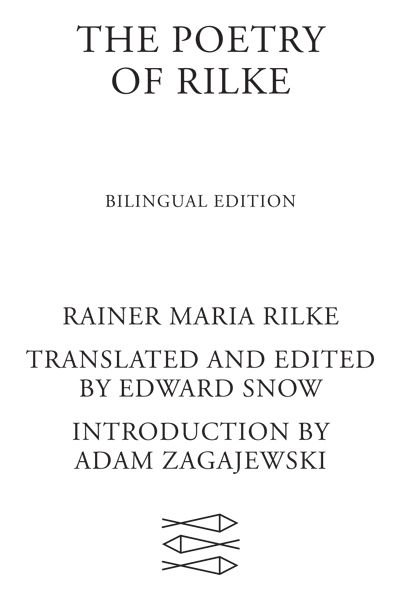 The author and publisher have provided this e-book to you for your personal use only. You may not make this e-book publicly available in any way. Copyright infringement is against the law. If you believe the copy of this e-book you are reading infringes on the authors copyright, please notify the publisher at: us.macmillanusa.com/piracy. Contents Introduction
The author and publisher have provided this e-book to you for your personal use only. You may not make this e-book publicly available in any way. Copyright infringement is against the law. If you believe the copy of this e-book you are reading infringes on the authors copyright, please notify the publisher at: us.macmillanusa.com/piracy. Contents Introduction
REREADING RILKE by Adam Zagajewski We read Rilke for his poetry, for his prose, for his novel The Notebooks of Malte Laurids Brigge, and for hundreds if not thousands of the letters he left, but there seems to be another important motive too: in our eyes his life presents itself as a flawless example of a modern artists existence, an example purer perhaps than any other, perfect in its relentless pursuit of beauty. In the German literary tradition it is Johann Wolfgang von Goethe who enjoyed for a very long time the status not only of an immense poet, playwright, and novelist but also of a sublime role model, an ideal human being, highly successful yet knowing the price of resignation, standing in the middle of a bourgeois society that had just rediscovered the value of intellectual accomplishment; Goethe, who happily accepted the position of someone who represented more than just his own singular destiny, graciously allowing othersthrough the numerous windows of his letters, diaries, and conversationsto have a look at him in his different hours and moods; Goethe, the scion of a patrician Frankfurt family, who as a young man became a minister at the Weimar court and a scientist entertaining each night in his lovely house on Frauenplan visitors from every imaginable country, explaining to them secrets of geology, biology, and literaturesomeone Napoleon would wish to meet and, as we know, did meet.
Goethe, who renewed the German imagination even as he remained skeptical of the newborn nationalism of his compatriots during the Napoleonic Wars; Goethe, who was proud of his long life and didnt stop short of mocking others for dying too early; Goethe, a poet and thinker whose spiritual territory was so vast that it encompassed many elements of the Enlightenment but also involved vital ingredients of the Romantic era; and finally, Goethe, who knew well the silence of the writers study but who also witnessed in 1792 the misery of premodern warfare in the mud, hunger, and hopelessness of an unsuccessful military campaignnot as a soldier but as an observer sharing the misery of others. And then, next to this giant, Rainer Maria Rilkea diffident, homeless poet born on the periphery of the Habsburg Empire, an artist who had to invent his own pedigree, who claimed an aristocratic lineagethe claim seems rather doubtfulan introvert, a lover of solitude, someone who, especially in his later years, didnt care much for publishing and remained until the end of his short life famous only among a rather small group of connoisseurs. Never a minister like Goethe, never a senator like Yeats, never an ambassador like Saint-John Perse. Yes, he enjoyed the company of aristocrats, but not at any court; hed only see them as private persons, gladly when they were set against the background of their natural environment, their castles and palaces: they were for him colorful relics of a more or less imaginary medieval Europe. The fact that Duino Castleits name is forever linked to Rilkes poetrywhich belonged to the Thurn und Taxis family, was destroyed in World War I (though later rebuilt) is symptomatic: the aristocrats Rilke knew were the shadows of once powerful magnates. None of the influential politicians of his time would have thought of meeting him.
Clemenceau and Rilke? Lloyd George and Rilke? Lenin and Rilke? No, impossible, ridiculous: a joke. Paul Valry? Yes, that makes sense; the two poets met and their meeting left a trace, a well-known photograph (but also and foremost Rilkes translations of Valrys poetry). What is so attractive for us in Rilkes symbolic status has almost nothing to do with the external circumstances of the period. Unlike Goethe, Rilke was not a robust representative of his epoch; he seemed to be, rather, an elegant question mark on the margin of history. Within the spectrum of literary modernism he stood among the antimoderns (in the sense of being hostile to many characteristics of the newly born industrial civilization), though he didnt care to develop his ideas in any coherent way. He was a poet, not a philosophical journalist, after all.
He was like the Chopin of Gottfried Benns marvelous poem: when Delacroix propounded theories / he grew restless, for his part he could not / explain the Nocturnes. It is his inner discipline, the discipline of his life, the sacrifices he made, that appeal to us. We cherish a certain intriguing narrowness of his external existence, which we can see and contemplate like an arrow ferociously speeding to its ultimate target: Rilkes poetic work. We believe we can see his rich inner life through the veil of his writings. If anything, Rilke was the epochs secret voice, we think, the epochs whisper, as opposed to its official expression. This, we think sometimes, is how his time should have been: not the absurd, terrifying killing fields of Verdun but the tranquillity of the poets meditation in the midst of a great city or an Alpine meadow.
His life spent in travels, his life as a search for the final illumination, fascinates us, but also his willingness to learn from Rodin and Czanne and, later, to teach a young poet what poetry is about. We like to imagine lonely Rilke in Toledo or in Ronda in Spain, or think of him in Rome or in Cairoand we always remember that from each of these travels he would bring with him a few pebbles we later find in the splendid mosaic of the Duino Elegies. A lonely person he was, and yet not a stranger to social life. An incredibly prolific letter writer, he once told Merlinethe nickname of Baladine Klossowska, the mother of Balthusthat he had to write 115 letters to make up for a backlog in his correspondence! These letters are extremely interesting, mostly written with the brio of the major artist he was, and should be seen as an important part of his oeuvre (as, for example, in the case of Elizabeth Bishops letters). The most mesmerizing part of this biography is Rilkes iron-willed waiting for the Duino Elegies to arrive, to visit his poetic mind. This is perhaps a unique case in the history of literature: a major poet who expected a certain poem for a long timenot any great poem but a particular oneapprehending its very nature, just not receiving it yet.
We, the latecomers, know that the first four of the ten elegies were written between 1912 and 1914 and that he had to wait eight years for the rest of them. In this perspective, World War I can be regarded as just a very unpleasant nuisance that kept the poems from comingwhich, by the way, is how Rilke himself often felt about the Great War. He didnt just waitlater, after the war was over and new possibilities opened up for him, he would, with some help from his friends, more or less actively look for a house, a tower, a quiet place on the planet in which to receive the Angels message. For this he eventually chose Switzerland, one of the very few European countries not disfigured by the scars of trenches. The Duino Elegies, as we know, did eventually arrive and gave a glorious meaning to his entire pilgrimage, to his waiting, to his procrastinating, to his moving from one villa to another, to his patience. They gave Rilkes life the shape of a work of art, made him into a twentieth-century emblem of poetry.
Nobody will admire Rilke as a father or husband; his phobia of being loved doesnt necessarily convince us, but the form his life acquired through his poetic achievement is awe-inspiring. When Rilke dies in Val-Mont of leukemia (famously not willing to know the name of his illness), we weep, but perhaps a bit less than we would weep for other artistsdidnt he announce that with the Elegies his work had come to a close? How could he live after them? As a retiree? Collecting stamps? Touring exotic countries with other retirees? Writing more mediocre French poems? Is it possible to be a poet in a more perfect way? Yes, Rilke, the pure artist. At the same time, for some he will be more of a problematic figure, a freeloader, a half-ridiculous social climber, a snob who impressed a record number of princesses and countesses with his lofty comportmentbut also with his writings. Few among the important modern poets have had so many admirers and so many detractors. Paul Claudel, for instance, noted once in his diary: This R. M.
Next pageFont size:
Interval:
Bookmark:
Similar books «The Poetry of Rilke»
Look at similar books to The Poetry of Rilke. We have selected literature similar in name and meaning in the hope of providing readers with more options to find new, interesting, not yet read works.
Discussion, reviews of the book The Poetry of Rilke and just readers' own opinions. Leave your comments, write what you think about the work, its meaning or the main characters. Specify what exactly you liked and what you didn't like, and why you think so.

